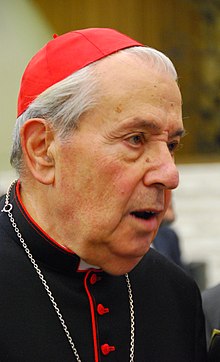Achille Silvestrini
| Styles of Achille Silvestrini | |
|---|---|
 | |
| Reference style | His Eminence |
| Spoken style | Your Eminence |
| Informal style | Cardinal |
Achille Silvestrini (born 25 October 1923, Brisighella, Italy) was one of the most prominent Vatican diplomats during the long reign of John Paul II. He was Cardinal Prefect of the Congregation for the Oriental Churches between 1991 and 2000.
Early life and ordination
Educated in Rome, Silvestrini became a priest on 13 July 1946, cathedral of Faenza, by Giuseppe Battaglia, bishop of Faenza. He celebrated his first mass in Brisighella, assisted by his uncle don Ludovico and the archpriest. Joined the Vatican diplomatic service, section of Extraordinary Ecclesiastical Affairs, Secretariat of State, in 1953; in charge of affairs of Vietnam, China, Indonesia, and Southeast Asia in general. In 1955, he formed part of the section of Extraordinary Ecclesiastical Affairs, directed by Monsignor Domenico Tardini.
He served as Personal secretary of Cardinals Domenico Tardini and Amleto Giovanni Cicognani. He was made Prelate of honour of His Holiness in 1965. In the Council for Public Affairs of the Church from 1969-1979 where he was in charge of the section for international organisations, peace, disarmament, and human rights. He traveled to Moscow with Archbishop Agostino Casaroli, secretary of the Council for Public Affairs of the Church, to deliver the instrument of adhesion of the Holy See to the Treaty on proliferation of nuclear weapons, 1971.
He was head of the Holy See delegation to the United Nations Conference on peaceful use of nuclear energy, Geneva, 1971, and to the Conference on compliance with the Treaty on Non-proliferation of Nuclear Weapons, Geneva, 1975. He was appointed Under-secretary of the Council for Public Affairs of Church on 28 July 1973.
Under Pope Paul VI, he continued as administrative secretary to Jean-Marie Villot, and his experience was welcomed by John Paul after he became Pope in 1978.

Bishop and Diplomat
Silvestrini became titular Archbishop of Novaliciana on 27 May 1979 and was consecrated by two other figures who were to play important administrative roles in John Paul's long papacy – Eduardo Martínez Somalo and Duraisamy Simon Lourdusamy.
He then turned his focus for the next five years to the renewal of the Lateran Treaty on its fiftieth anniversary, and his diplomatic skills allowed him to sign a revised treaty that reflected the rapid secularisation of Italy since the 1960s.
He was involved in a number of other concordats between the Vatican and nation-states, most notably in the Falklands War of the early 1980s and the war in Nicaragua slightly later.
Cardinal
On 28 June 1988 Silvestrini was rewarded for his service with a cardinal's hat, becoming Cardinal-Deacon of S. Benedetto fuori Porta S. Paolo. In 1991 he became Prefect of the Congregation for the Oriental Churches.
In 1999 Silvestrini was the papal representative to the funeral of King Hussein of Jordan. He retired from his post as Prefect a year later.
Papal elections
When the earliest speculation as to who would succeed John Paul II began in the middle 1990s, Silvestrini was a popular choice among liberal observers because he was seen as a man in the more moderate style of Paul VI rather than John Paul's hardline style. However, Vatican observers frequently noted that his advanced age would make his election unlikely.
When he turned eighty and thus became destined never to vote in a conclave in October 2003, Silvestrini became known as, along with his longtime counterpart Cardinal Giovanni Cheli as the strongest critic of that rule among over-eighties during the 2005 conclave. Silvestrini actually took no part in this conclave even during the pre-conclave discussions.
